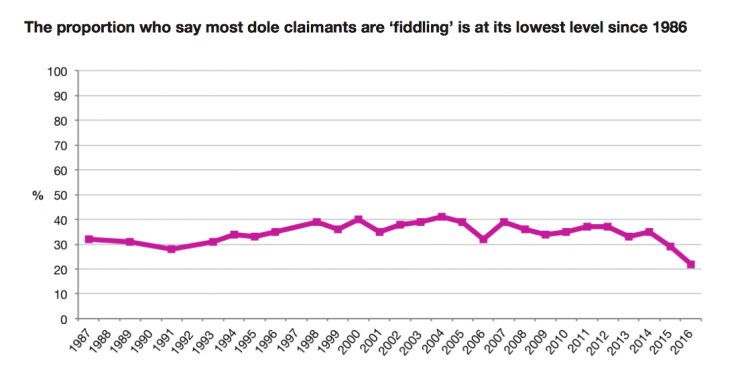British Social Attitudes report: Is Britain starting to sympathise with benefits claimants?

Britons are becoming more sympathetic to benefit claimants, according to a survey.
The annual British Social Attitudes report found that fewer people are suspicious of claimants.
The number of Britons who believe most dole claimants are ‘fiddling’ is at its lowest level for 30 years, the survey said.
The level dropped from 35% in 2014 to just 22% in 2016, the latest year of research. However, support for increasing benefits remained at only 16%.
Nine out of ten people think using false information to support a claim is usually wrong, the survey revealed, and Britons are tougher on benefit fraud than tax evasion.

More than two thirds (68%) think it is wrong to falsely claim £500 in benefits, compared to 56% who believe it is wrong to falsely claim the same amount in tax.
Six out of ten people think it is wrong for benefit claimants to use legal loopholes to increase their payments, compared with 48% thinking it is wrong to use legal loopholes to pay less tax.
MORE: Mystery over death of 11-year-old boy electrocuted at railway depot
MORE: Family pay tribute to ‘kind and generous’ five-year-old victim of Grenfell disaster
The report said: ‘Attitudes to benefit recipients are starting to soften and people particularly favour prioritising spending on disabled people.’
Nearly 3,000 people in England, Scotland and Wales were questioned between July and November 2016 for the survey by the National Centre for Social Research (NatCen).
Overall, the survey revealed that almost half of Britons believe the government should raise taxes and increase spending.

The 48% who backed increased taxes and spending is the highest proportion to support such measures since 2004.
Just 4% said they wanted to see taxes and spending on health, education and welfare cut, while 44% said the levels should remain the same.
Roger Harding, head of public attitudes at NatCen said: ‘People’s tolerance for austerity is drying up, even if that means higher taxes.
‘This leftwards tilt on tax and spend is matched by a long-running conservatism on national security and law and order.
‘In all, people want a more active state that’s firm but fairer.’

 Yahoo News
Yahoo News 

